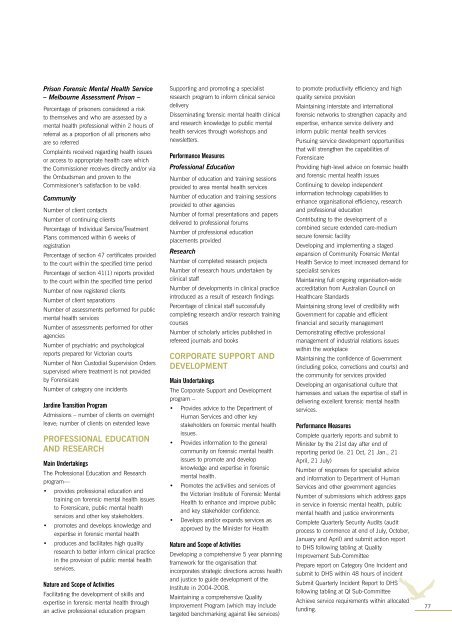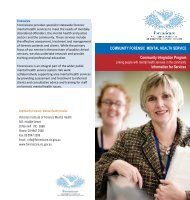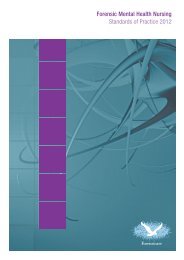Annual Report 2004-2005 - Forensicare
Annual Report 2004-2005 - Forensicare
Annual Report 2004-2005 - Forensicare
You also want an ePaper? Increase the reach of your titles
YUMPU automatically turns print PDFs into web optimized ePapers that Google loves.
Prison Forensic Mental Health Service<br />
– Melbourne Assessment Prison –<br />
Percentage of prisoners considered a risk<br />
to themselves and who are assessed by a<br />
mental health professional within 2 hours of<br />
referral as a proportion of all prisoners who<br />
are so referred<br />
Complaints received regarding health issues<br />
or access to appropriate health care which<br />
the Commissioner receives directly and/or via<br />
the Ombudsman and proven to the<br />
Commissioner’s satisfaction to be valid.<br />
Community<br />
Number of client contacts<br />
Number of continuing clients<br />
Percentage of Individual Service/Treatment<br />
Plans commenced within 6 weeks of<br />
registration<br />
Percentage of section 47 certificates provided<br />
to the court within the specified time period<br />
Percentage of section 41(1) reports provided<br />
to the court within the specified time period<br />
Number of new registered clients<br />
Number of client separations<br />
Number of assessments performed for public<br />
mental health services<br />
Number of assessments performed for other<br />
agencies<br />
Number of psychiatric and psychological<br />
reports prepared for Victorian courts<br />
Number of Non Custodial Supervision Orders<br />
supervised where treatment is not provided<br />
by <strong>Forensicare</strong><br />
Number of category one incidents<br />
Jardine Transition Program<br />
Admissions – number of clients on overnight<br />
leave; number of clients on extended leave<br />
PROFESSIONAL EDUCATION<br />
AND RESEARCH<br />
Main Undertakings<br />
The Professional Education and Research<br />
program—<br />
• provides professional education and<br />
training on forensic mental health issues<br />
to <strong>Forensicare</strong>, public mental health<br />
services and other key stakeholders.<br />
• promotes and develops knowledge and<br />
expertise in forensic mental health<br />
• produces and facilitates high quality<br />
research to better inform clinical practice<br />
in the provision of public mental health<br />
services.<br />
Nature and Scope of Activities<br />
Facilitating the development of skills and<br />
expertise in forensic mental health through<br />
an active professional education program<br />
Supporting and promoting a specialist<br />
research program to inform clinical service<br />
delivery<br />
Disseminating forensic mental health clinical<br />
and research knowledge to public mental<br />
health services through workshops and<br />
newsletters.<br />
Performance Measures<br />
Professional Education<br />
Number of education and training sessions<br />
provided to area mental health services<br />
Number of education and training sessions<br />
provided to other agencies<br />
Number of formal presentations and papers<br />
delivered to professional forums<br />
Number of professional education<br />
placements provided<br />
Research<br />
Number of completed research projects<br />
Number of research hours undertaken by<br />
clinical staff<br />
Number of developments in clinical practice<br />
introduced as a result of research findings<br />
Percentage of clinical staff successfully<br />
completing research and/or research training<br />
courses<br />
Number of scholarly articles published in<br />
refereed journals and books<br />
CORPORATE SUPPORT AND<br />
DEVELOPMENT<br />
Main Undertakings<br />
The Corporate Support and Development<br />
program –<br />
• Provides advice to the Department of<br />
Human Services and other key<br />
stakeholders on forensic mental health<br />
issues.<br />
• Provides information to the general<br />
community on forensic mental health<br />
issues to promote and develop<br />
knowledge and expertise in forensic<br />
mental health.<br />
• Promotes the activities and services of<br />
the Victorian Institute of Forensic Mental<br />
Health to enhance and improve public<br />
and key stakeholder confidence.<br />
• Develops and/or expands services as<br />
approved by the Minister for Health<br />
Nature and Scope of Activities<br />
Developing a comprehensive 5 year planning<br />
framework for the organisation that<br />
incorporates strategic directions across health<br />
and justice to guide development of the<br />
Institute in <strong>2004</strong>-2008.<br />
Maintaining a comprehensive Quality<br />
Improvement Program (which may include<br />
targeted benchmarking against like services)<br />
to promote productivity efficiency and high<br />
quality service provision<br />
Maintaining interstate and international<br />
forensic networks to strengthen capacity and<br />
expertise, enhance service delivery and<br />
inform public mental health services<br />
Pursuing service development opportunities<br />
that will strengthen the capabilities of<br />
<strong>Forensicare</strong><br />
Providing high-level advice on forensic health<br />
and forensic mental health issues<br />
Continuing to develop independent<br />
information technology capabilities to<br />
enhance organisational efficiency, research<br />
and professional education<br />
Contributing to the development of a<br />
combined secure extended care-medium<br />
secure forensic facility<br />
Developing and implementing a staged<br />
expansion of Community Forensic Mental<br />
Health Service to meet increased demand for<br />
specialist services<br />
Maintaining full ongoing organisation-wide<br />
accreditation from Australian Council on<br />
Healthcare Standards<br />
Maintaining strong level of credibility with<br />
Government for capable and efficient<br />
financial and security management<br />
Demonstrating effective professional<br />
management of industrial relations issues<br />
within the workplace<br />
Maintaining the confidence of Government<br />
(including police, corrections and courts) and<br />
the community for services provided<br />
Developing an organisational culture that<br />
harnesses and values the expertise of staff in<br />
delivering excellent forensic mental health<br />
services.<br />
Performance Measures<br />
Complete quarterly reports and submit to<br />
Minister by the 21st day after end of<br />
reporting period (ie. 21 Oct, 21 Jan., 21<br />
April, 21 July)<br />
Number of responses for specialist advice<br />
and information to Department of Human<br />
Services and other government agencies<br />
Number of submissions which address gaps<br />
in service in forensic mental health, public<br />
mental health and justice environments<br />
Complete Quarterly Security Audits (audit<br />
process to commence at end of July, October,<br />
January and April) and submit action report<br />
to DHS following tabling at Quality<br />
Improvement Sub-Committee<br />
Prepare report on Category One Incident and<br />
submit to DHS within 48 hours of incident<br />
Submit Quarterly Incident <strong>Report</strong> to DHS<br />
following tabling at QI Sub-Committee<br />
Achieve service requirements within allocated<br />
funding.<br />
77














